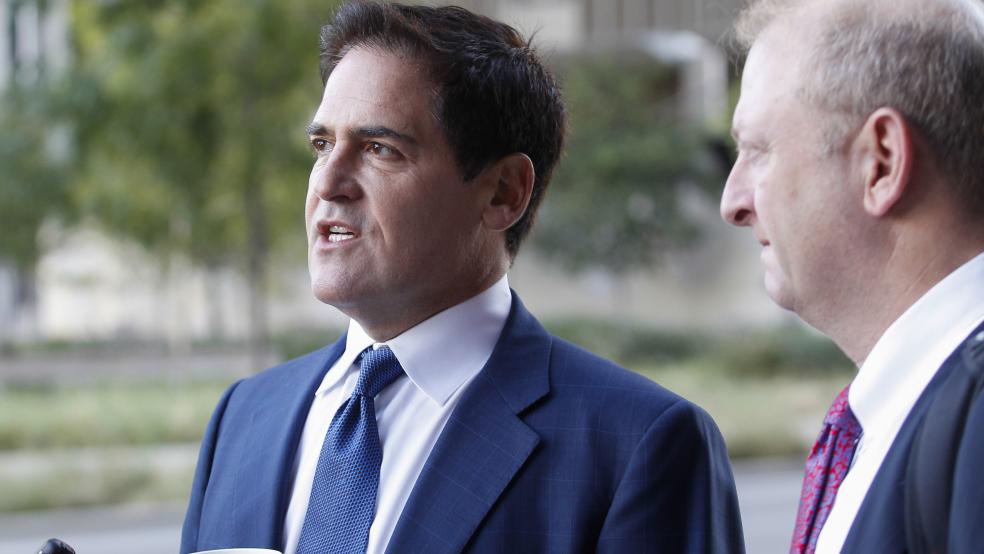Mark Cuban won’t make a prediction about the NBA finals, doesn’t want to talk about the record $2 billion purchase of the Los Angeles Clippers, or share his thoughts on whether or not the league is becoming too politically correct. But don’t worry, he hasn’t gone shy on us. The talkative — and often provocative — owner of the Dallas Mavericks and co-star of ABC’s hit-series Shark Tank has a lot to say about Washington dysfunction and how to improve the economy.
Cuban, who rose to riches by building Broadcast.com and selling it to Yahoo during the dot-com bubble, remains a serial entrepreneur — he’s taking on Snapchat by launching an app called Cyber Dust for private texting and backing MotionLoft, which makes sensors that track pedestrian and vehicle traffic. And Cuban remains a champion of startups and small businesses, The Fiscal Times spoke with him about the environment for entrepreneurship today.
Reilly Dowd (RD): If you were just starting out today, what would you look to do? Would you still start your own business?
Mark Cuban (MC): I would definitely start a business. It would probably be what I'm doing right now. Creating businesses and apps like Cyber Dust and MotionLoft where I think there are opportunities.
Related: Startups Promise Self-Destructing Emails
RD: If you could send President Obama one message via Cyber Dust today, what would it be?
MC: Put a $10,000 annual limit on the amount of federal guarantees available to any individual [for student loans].
RD: Some research shows that dynamism is slowing down, the formation of new firms has been on a persistent decline, and there’s a drop-off in U.S. entrepreneurship. Your thoughts on why? What might this mean for the future of entrepreneurship in America?
MC: That research is faulty. There is a reason Shark Tank is so popular. People are still inspired. The American dream is still alive and well.
RD: What could or should Washington do to encourage entrepreneurship and support fast-growing companies? Is gridlock in Washington hurting the start-up world?
MC: Extend Obamacare to include any and all startups that are 3 years old or younger. Allow all employees to sign up at HealthCare.gov.
That solves several problems for entrepreneurs. First, it allows them to quit a job they are keeping only to get health insurance. Second, it allows them to hire people who want to work for your startup but won’t unless you have full health care. Third, one of the biggest productivity and profitability time sucks for an entrepreneur is that we have to spend time trying to figure out all the different health care options and what we can and can’t offer to employees. Every second spent on trying to figure out health care is time taken away from the core competencies of our companies.
Related: The One Risk Businesses Worry About Most
The bottom line is that the value we can add by taking health care out of the startup equation and allowing entrepreneurs to focus that time on increasing the values of our companies [adds] more aggregate value to the economy and the country than the inefficiencies and waste that the government introduces by managing our health care.
RD: What else could Washington do?
MC: One-touch business licenses. There is too much bureaucracy, which creates artificial barriers and costs that complicates the process for startups and diverts needed time and cash. Every license should resolve all licenses for the local and state.
RD: Would you prefer the GOP win both the Senate and the House?
MC: I don’t have a preference. I’m independent. I believe both parties are equally inefficient.
Related: Senate Dems Make New Unemployment Insurance Push
RD: Futurist and economic theorist Jeremy Rifkin has an interesting take: He says the shift to a “sharing economy” could dramatically narrow the income divide and democratize the global economy. What do you think about that?
MC: I agree, at least as it applies to the United States and Canada. When people can sell their time rather than a skill, it allows a broader spectrum of untrained people to earn a living. I actually have met with administration officials and have had discussions about the importance of the sharing economy. The president definitely gets it.
Globally, it’s a different issue because of the smartphone and connectivity that is required.
RD: As an NBA owner, are you surprised by how much the Los Angeles Clippers sold for?
MC: No.
RD: What’s your prediction for the NBA finals winner? And in how many games?
MC: I don't make predictions for the NBA. It's a no win situation :)
Top Reads from The Fiscal Times:
- Dems Propose Social Security Expansion…and a New Tax
- 9 Takeaways from Hillary Clinton’s New Memoir
- We’re One Step Closer to Our New Robot Overlords



